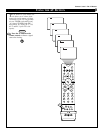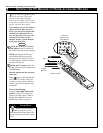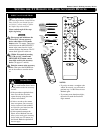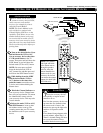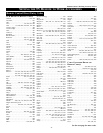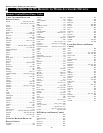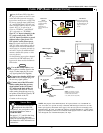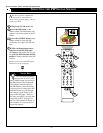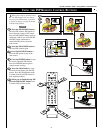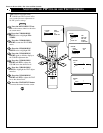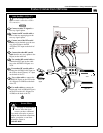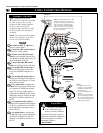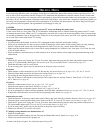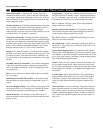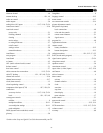
56
GLOSSARY OF TELEVISION TERMS
Audio/Video Inputs ¥ Connectors (RCA phono-type plug),
located on the back of the TV, used for the input of audio and
video signals. These inputs are designed for use with VCRs (or
other accessories) to receive higher picture resolution and offer
sound-connection options.
Closed Captioning ¥ The broadcast standard feature that allows
you to read the voice content of television programs on the TV
screen. Designed to help the hearing impaired, Closed
Captioning uses on-screen text boxes to show dialogue and con-
versations while a TV program is in progress.
Component Video Input ¥ The input that allows the separate
reception of blue, red, and luminance signals. Provides the high-
est possible color and picture resolution in the playback of digi-
tal signal source material, such as the kind available from DVD
players. Allows improved bandwidth information not possible
through composite video (A/V) or S-Video Connections.
Identify ¥ The method by which a TV remote control searches
and finds an operating code for another product (such as a VCR
or a cable converter). After the code has been Òidentified,Ó the
TV remote control can operate and send commands to the other
product.
Incredible Stereo (or Surround) ¥ False acoustic management
of the audio signal that produces a dramatic expansion of the
wall of sound that surrounds the listener and heightens overall
viewing pleasure.
Menu ¥ An on-screen list of feature controls that are available
for you to adjust.
Multichannel Television Sound (MTS) ¥ The broadcast stan-
dard that allows for stereo sound to be transmitted with the TV
picture.
On-screen Displays (OSD) ¥ The wording or messages generat-
ed by the television (or VCR) to help you with specific feature
controls (color adjustment or programming, for example).
Picture-in-Picture ¥ The showing of two pictures on the TV
screen at the same time (one main screen picture and one small
picture, or PIP).
Programming ¥ The process of adding or deleting channel num-
bers in the televisionÕs memory circuits. Through programming,
the TV ÒremembersÓ only the locally available or desired chan-
nel numbers and skips over any unwanted channel numbers.
PTV ¥ Projection Television. (Rear- and/or front-projection
design systems are available.)
Remote Control Sensor Window ¥ The window or opening
found on the television control panel through which infrared
remote control command signals are received.
RF ¥ Radio Frequency or modulated signal design used as the
carrier for television broadcasts.
RF coaxial cable ¥ Used to connected a broadcast or cable sig-
nal to the TV. Also can be used to connect a VCR to the TV (or
cable box or DBS).
Second Audio Program (SAP) ¥ An additional audio channel
provided for in the Multichannel Television Sound (MTS) broad-
cast standard. A monaural soundtrack included within the record-
ed or video signal (usually containing a second language transla-
tion for the displayed programming).
Status ¥ Allows the user to quickly confirm what channel num-
ber is currently being viewed. Status can also be used to clear
the TV of on-screen displays or information (rather than waiting
for the displays to Òtime out,Ó or automatically disappear from
the screen).
S-Video Input ¥ Signal input that allows direct connection of
high-resolution video sources, such as satellite, DVD (digital
video disc), S (Super)-VHS videocassette recorder, or video
games. Provides improved picture resolution, sharpness, and
clarity.
TwinÐlead Wire ¥ The more commonly used name for the two-
strand, 300-ohm antenna wire used with many indoor and out-
door antenna systems. In many cases, this type of antenna wire
requires an additional adapter (or balun) in order to connect to
the 75-ohm input terminals designed into the more recent TVs
and VCRs.
General Information • Glossary



